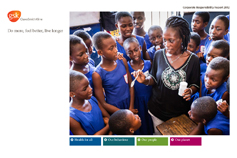The fight against malaria
By the time the second hand on your wristwatch has circled its dial, a child will have died of malaria. And by the time those minutes have added up to a year, nearly 655,000 people - most of them African children - will have died from the disease.
Malaria has been a health problem for much of human history, but recent progress in scaling up the use of bed-nets and anti-malarial treatments has seen annual deaths from malaria fall. And in clinical trials, fresh ripples of excitement are emerging among normally restrained and cautious scientists.
What causes malaria?
The enemy is tiny, but it packs a punch. Malaria is caused by parasites of the Plasmodium species, which are spread to people by mosquitoes carrying the parasites. If you are unlucky enough to get an infection, you can expect fever, shivering and vomiting. And if left untreated, it can lead to anaemia, seizures, coma and death.
The cause may be microscopic, but the problem it presents is huge. Over half the world’s population lives in areas affected by the disease, with the most infections occurring in sub-Saharan Africa. Along with tuberculosis and HIV/AIDs, it is a priority disease for the World Health Organization.
Our approach
We are determined to help stop this disease, and along with our partner organisations we are optimistic this can be achieved. Our malaria strategy involves three prongs of attack: R&D for new malaria treatments and vaccines, community investment activities through our African Malaria Partnership, and preferential pricing for anti-malarials in the least developed countries and sub-Saharan Africa. Malaria is preventable and treatable, and all three approaches have their place.
Our African Malaria partnership was established in 2001. It focuses on educating communities about malaria and the preventative measures that can be taken against it, such as sleeping under treated bed nets and seeking immediate treatment for children showing signs of fever. But it is possible vaccination against the disease that is causing the recent ripples of excitement.
A vaccine against malaria?
For the past 30 years, GSK scientists have been working with others around the world to try and develop a vaccine against malaria. Our vaccine candidate – RTS,S – is being developed in partnership with PATH MVI, supported by grants from the Bill & Melinda Gates Foundation. It aims to trigger the immune system to defend against the malaria parasite, Plasmodium falciparum.
While RTS,S continues to be evaluated in a large Phase III study in Africa, our commitment to tackling malaria through other routes remains. It is too early to say whether malaria’s time is up, but it is now fighting on many fronts, and the clock must be ticking.








